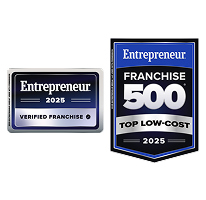It depends.
That’s probably not the answer you want to hear when asking whether business franchising makes a good retirement investment strategy, but the truth is, there are a lot of franchises. Some would make excellent retirement investments. Others, not so much.
There are a lot of factors to consider before deciding whether to enter your retirement years as a new business owner/franchisee. Here’s what you should first consider as you navigate retirement business ideas.
Why Retirees Are Turning to Franchising
Willie Sutton was supposed to have replied when asked why he robbed banks, “Because that’s where the money is.”
You might find the same advantage with profitable franchises. It’s a key reason some older Americans decide to change fields rather than fully retiring. They become franchisees. But franchising isn’t always about acquiring great wealth late in life. Some go into the business just to supplement their retirement savings.
You might be done with your work world, but you still want to contribute. You’re happy to be retired from the day-to-day as an employee, but you don’t feel that it’s time to take to your rocking chair and watch the sun set. There’s plenty more you’d like to do, but you want to do it on our own terms. At your pace. So you’re considering owning your own business and being your own boss.
Other retirees might want to pass along an established business to younger family members. And still others simply want to work up a little sweat and stay challenged in their senior years.
Whatever your set of reasons, there are franchise operations that are ideal for providing business ownership after retirement. But fully investigate the risk potential. How much of that would you like to take on?
In other words, your potential for post-retirement entrepreneurial success depends on the franchise — and the passion and commitment you bring to the enterprise.
The Pros of Investing in a Franchise During Retirement

The right franchise operation will always have an excellent training program and ongoing support — a particular advantage for first-time business owners. You should also have a recognized and respected brand and built-in customer loyalty, a definite advantage over starting a business with no name recognition whatsoever.
Also, depending on the franchise you select, you might be able to comfortably run it on a partly passive basis or with a manager in place on a day-to-day basis.
In short, while you’ll still have the challenges and obstacles of any startup venture, the franchise business model can make a business easier to launch and run in your post-retirement years.
Key Risks and Considerations for Retired Franchisees
Don’t expect your franchise ownership experience to be instant wealth with no risks in sight. There’s plenty you must be aware of and ready for, as with a business startup at any age.
You’ll have a lot to learn, and, depending on the kind of franchise you buy, there might even be physical demands you might not be ready for. Can you still comfortably operate a window-washing enterprise or carpet cleaning business, or load and unload a truck?
And of course, beyond all else, there are financial considerations. Are there obtainable tax incentives? Can you afford, at this later stage in your life, taking the risk of losing your startup capital if the business doesn’t take off like you thought it would?
You have a lot to think about before you sign papers and buy your business and become a semi-retired (or very active) franchise owner.
The Best Types of Franchises for Retirement Investors
Here are a handful of business categories in which you might consider investing in your golden years. Most franchises have the potential to enhance your later years both emotionally and financially. But some might be easier to start and operate than others. Here are a few favorite categories.
Insurance
As an insurance broker, you’ll have no physical inventory to buy or store. You can start out working from your own home rather than from an expensive office, and you don’t need any employees until business takes off. And insurance — auto, renters, homeowners, life, and other lines — is something everyone needs. Therefore, you have a huge customer base, especially if you’re a franchisee with a well-known and respected brand.
B2B and Professional Services
Maybe you were a lawyer, accountant, engineer, or business consultant during your first-stage working career. You can do basically the same thing as a franchisee — except that you own the business and are your own boss. There’s no ceiling to your potential. Much like the insurance business, you won’t have to buy inventory, hire employees, or rent office space as you start out.
Education/Tutoring
Become the voice of experience. This is a field in which your age might be an advantage. Perhaps you have more patience now than you did when you were younger. You certainly have an abundance of knowledge. You might also feel a great deal of value in being able to share what you know with a younger generation as a franchise-owning tutor, educator, or coach.
Passive Investment Franchises
There are two different ways to look at this category. In the semi-passive arena, you have businesses such as coin laundries and vending machine companies, which can be operated on a part-time basis. Then you have the truly passive franchise model in which you become a silent partner as an investor. You provide the startup capital, while others contribute the elbow grease in the day-to-day operation.
Can You Afford It?
Naturally, this will be the first of many questions you’ll ask yourself. Get help in seeking answers. Get comprehensive and candid input from the franchise representative of any franchisor that draws your interest.
Your rep will give you a franchise disclosure document. They’re legally bound to do so. Your FDD should contain the details and small print of the transaction, including all cost categories. After you carefully read your FDD, let your accountant, lawyer, partners, and all other involved financial parties read it and ask their own critical questions.
One of your first and most important cost categories will be your franchise fee. That’s what you’ll pay to gain the name, logo, signage, brand recognition, and ways of doing business of the franchisor. You might also be charged a fee to share in the marketing costs, and you’ll pay royalties when you sell the products or services your franchisor owns.
In addition to this, you’ll have the more typical startup costs that any new business owner must pay. That might include workforce costs (if you have employees), rent, utilities, supplies, and working capital.
Add it all up, and hold meetings with your money people to see if the funding available is sufficient and the opportunity is truly worth the cost.
Is Franchising a Good Retirement Investment for You? If So, Consider Freeway

If, after giving it a lot of thought, you’re still excited about the idea of investing in a franchise during retirement, we hope you check in with your Freeway Insurance franchise rep.
You can start a Freeway Insurance franchise very affordably. Launch it from your home. You can be your sole employee at first. You’ll have no physical inventory to buy or warehouse, and you’ll inherit a built-in customer base and a highly respected brand.
We’ll give you top-tier training and even help you get the state certifications you’ll need. We’ll have your back with expert advice and guidance when you need it, and supply you with leading insurance products from known and respected brands.
You might want to own your own business in your retirement years — but you don’t want to be alone. You’ll always have Freeway support, 24/7. Let’s talk. Call us at 877-822-3024. You can also give us your contact information, and we’ll reach out to you to explain your second-stage career in further detail.
FAQ About Franchising for Retirement
Does business ownership after retirement make sense to you? Can you see yourself as a semi-retired franchise owner? Here are a couple of questions worth your serious consideration.
Can You Run a Franchise Part-Time in Retirement?
Some franchise operations are easier to run on a more passive basis than others. One way to get answers is to ask other franchisees of that operation how many hours a week they work. Do they think it’s something they could do in, say, 20 hours a week or so? Is it still worth it to you if you find that more of a time commitment is required?
How Long Does It Take Before a Franchise Achieves Profitability?
That’s going to vary according to the type of business and the capital outlay needed to launch the enterprise. Ask your franchise representative when their franchisees typically begin to see a return on investment. And once again, this is a good question to ask other franchisees.



